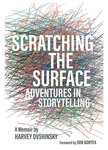

Detroit media personality Harvey Ovshinsky’s memoir “Scratching the Surface: Adventures in Storytelling” is a cathartic journey.
While attempting to scratch the surface of his life, Ovshinsky navigates the muddy waters of his career, his family and the history of his famous father, Stanley Ovshinsky, a scientist who was an important trailblazer for alternative energy sources.
In his earliest days in Detroit as co-founder of the city’s underground newspaper The Fifth Estate, Harvey was as a leader in alternative media. Ovshinsky was inspired to start the newspaper, which continues to this day, as the result of one of his less fond experiences when he was shipped off to California to live with his newly married mother.
In his book, he writes: “Before discovering The Los Angeles Free Press, I had all but given up hope. It was a zoo. But it was my kind of zoo, and for the first time since being yanked away from the mother planet, it finally felt like home.”
Returning home, he gathered enough news and advertising, along with a $300 loan from his father, to print a first edition in November 1965. His time at The Fifth Estate would set the tone for the rest of his adult passions, where he would rush in to complete a film or a complex project with no fear.
In his book, Ovshinsky explains that he was inspired by his father’s own career, which had its own number of failed enterprises.
“My father would say, ‘There are no failed experiments,’” Ovshinsky said.
Ovshinksy admits the first edition of the newspaper was horrid, but he quickly enlisted the aid of the Detroit’s underground creative couple John and Leni Sinclair, who added their credibility and writing and photographic skills. Later, Peter Werbe would come on board and lead the paper.
Ovshinsky, a consummate story teller, said he uses examples from his own life to illustrate how everything is a story waiting to be told. While publishing The Fifth Estate, Ovshinsky and thousands of other Michiganians came under the watchful eye of The Red Squad, a secret police operation which collected information on radicals.
He laughs about those police files today, and in his memoir, he recounts how decades later he drew on details in his police own files to recall lost dates, time and places.
A hard dose of reality in the form of a draft notice would soon impinge on Oshinsky’s plans. He was granted conscientious objector status and went to work at a local mental institution. His draft status, coupled with him tiring of the politics of The Fifth Estate, would lead to his next job at WABX, one of the original underground rock radio stations.
He also would co-host a show on WXYZ-FM. As he writes in his book, he had no experience writing or delivering the news. “I never knew what I didn’t know,” Ovshinsky said. It was in radio where he began not just reporting but telling stories while interviewing luminaries in the music industry.
His next venture would be with a small video production group, where he had a hand in producing the cult classic “Barrington Bunny.” After spinning off into his own production company in 1975, he would go to work for his father, who, although a genius level researcher and inventor, could not communicate his ideas.
In 1976, Ovshinsky said he “sold out” by taking a job at WXYZ as a producer with “training wheels.” With his sights on becoming a documentary videographer, he moved to WDIV-TV and then to WTVS, where he would produce local content, which would later lead to his creating documentaries such as “Who Killed Vincent Chin?”
Despite his on again-off again relationship with his mother, she would leave him a legacy, which enabled him to start his own film company in 1986 called HKO Media. The company produced commercials and short docs for Chrysler and Blue Cross Blue Shield.
When boiled down, Ovshinsky’s memoir centers on the importance of going whole hog and telling your clients’ stories. One of his most satisfying projects was the Regional Emmy Award-Winning documentary about Detroit outsider artist Tyree Guyton, “The Voodoo Man of Heidelberg Street.” He would also produce a documentary about racial topics, including housing discrimination in Grosse Pointe and Martin Luther King Jr.’s visit to Detroit. The capstone of his career is spent teaching at Grosse Pointe Academy, where he would teach poetry. Among the parents at the time was punk legend Patti Smith.
Now about the memoir’s title. “Scratching” refers to the process a creative person must put into any project. Scratching the itch is something Ovshinsky has been doing his entire life. “I spilled the beans,” as he likes to call it.
Support City Pulse - Donate Today!
Comments
No comments on this item Please log in to comment by clicking here